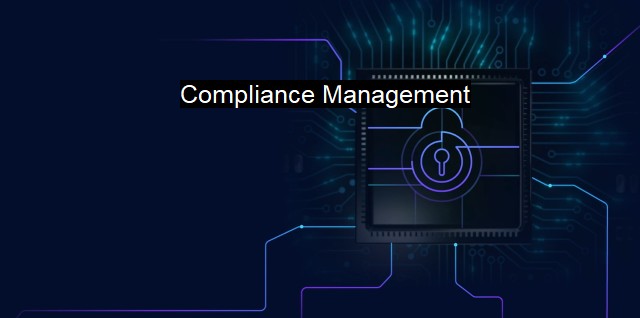What is Compliance Management?
Secure Data Systems: The Essential Role of Compliance Management and Antivirus Software in Today's Digitally Driven Economy"
Compliance management is a critical aspect of cybersecurity and antivirus implementation in organizations. It refers to the methodical practice of identifying, grouping, and operating in adherence to regulations mandated by regulatory and standardization bodies. Compliance is mainly focused on ensuring that individuals and organizations abide by laws, regulations, standards, and procedures that apply to their particular industry or operational context.The concept of compliance management emerges from the necessity for organizations to meet the various requirements established by these standards bodies, including those relating to cybersecurity and antivirus protection. For instance, organizations that handle sensitive customer or personal data, such as banks, hospitals, or e-commerce businesses would need to comply with various cybersecurity and data protection regulations. These may demand specific types of antivirus protection, appropriate data encryption methods, or specific practices regarding storing and sharing data.
Certainly, the non-compliance of these defined standards and regulations could result in huge penalties, both monetary and non-monetary, like damage to the organizations' reputation, loss of customers trust, and make the organization susceptible to various cyber threats. with the ever-evolving cybersecurity landscape, compliance management is no more just a one-time activity; it is a continuous process that demands persistent attention, improvements, and updation to keep the organization's security posture robust and resilient against expanding cyber threats and vulnerabilities.
Compliance management generally involves multiple facets. It involves planning the organization's cybersecurity strategy, configuring and implementing security processes and controls, regularly monitoring the system for threats, maintaining a record of data breaches if any, and ensuring that the proper security regulations are being met and maintained.
Noteworthy among these tasks is the implementation of antivirus software. Antivirus programs provide an essential defense layer against malware, which includes viruses, worms, and spyware. Consequently, part of compliance management is to ensure that an effective antivirus program is installed and regularly updated on all of the organization's systems, that the software performs routine checks and scans, and that it successfully identifies and obstructs potential threats. In other words, antivirus compliance makes sure the antivirus activities are aligned with the organization's overall cybersecurity policy and objectives.
Hence, compliance management involves activities that ensure an organization adheres to its established compliance requirements. In the area of cybersecurity and antivirus protection, this means creating a proactive rather than reactive strategy, one that predicts threats, plans the appropriate response, and includes provisions for business continuity in case of cyber attacks or incidents.
Another aspect that significantly contributes to bolstering the compliance management process today is automation and the use of AI. Embracing automation enhances the capabilities of detection, analysis, and response to potential cyber threats, making the management process incredibly streamlined, leaving minimal chances for human error, and lowering the response time remarkably.
Compliance management also lands a mindset whereby all organization members understand the importance of complying with their implemented security policies and practices; this promotes a culture of safety and security in the organization.
Compliance management in the context of cybersecurity and antivirus can be considered a strategically designed plan to adopt and continually improve practices that augment the organization's security posture. It mitigates risks, averts possible data breaches, guards against financial and reputation loss, bestows customer trust, and ensures a safe sailing in the ever-volatile cybersecurity landscape of the digital era. With the immeasurable value it holds for both the operation and reputation of a business, compliance management in cybersecurity is not just a concern of the IT department, but of the entire organization.

Compliance Management FAQs
What is compliance management in the context of cybersecurity?
Compliance management in cybersecurity refers to the practices and processes put in place to ensure that an organization adheres to relevant regulations, standards, and policies. These could include regulations related to data privacy or industry-specific requirements such as HIPAA for healthcare organizations.What are the benefits of compliance management in cybersecurity?
Compliance management ensures that organizations are following mandated requirements, which helps to reduce the risk of data breaches and cyber attacks. Compliance also helps to build trust with customers and stakeholders and can help organizations avoid costly fines and legal penalties.What are some common compliance management frameworks in cybersecurity?
Some common compliance management frameworks in cybersecurity include the Payment Card Industry Data Security Standard (PCI DSS), the Health Insurance Portability and Accountability Act (HIPAA), the General Data Protection Regulation (GDPR), and the National Institute of Standards and Technology Cybersecurity Framework (NIST CSF).What are some key activities involved in compliance management for antivirus software?
Activities involved in compliance management for antivirus software could include conducting regular scans and updates, ensuring that all software licenses are up to date and legally compliant, and ensuring that antivirus software is configured properly to provide optimal protection against malware and other threats. Additionally, organizations may need to maintain detailed records of antivirus activity to demonstrate compliance in case of an audit or investigation.| | A | | | B | | | C | | | D | | | E | | | F | | | G | | | H | | | I | | | J | | | K | | | L | | | M | |
| | N | | | O | | | P | | | Q | | | R | | | S | | | T | | | U | | | V | | | W | | | X | | | Y | | | Z | |
| | 1 | | | 2 | | | 3 | | | 4 | | | 7 | | | 8 | | |||||||